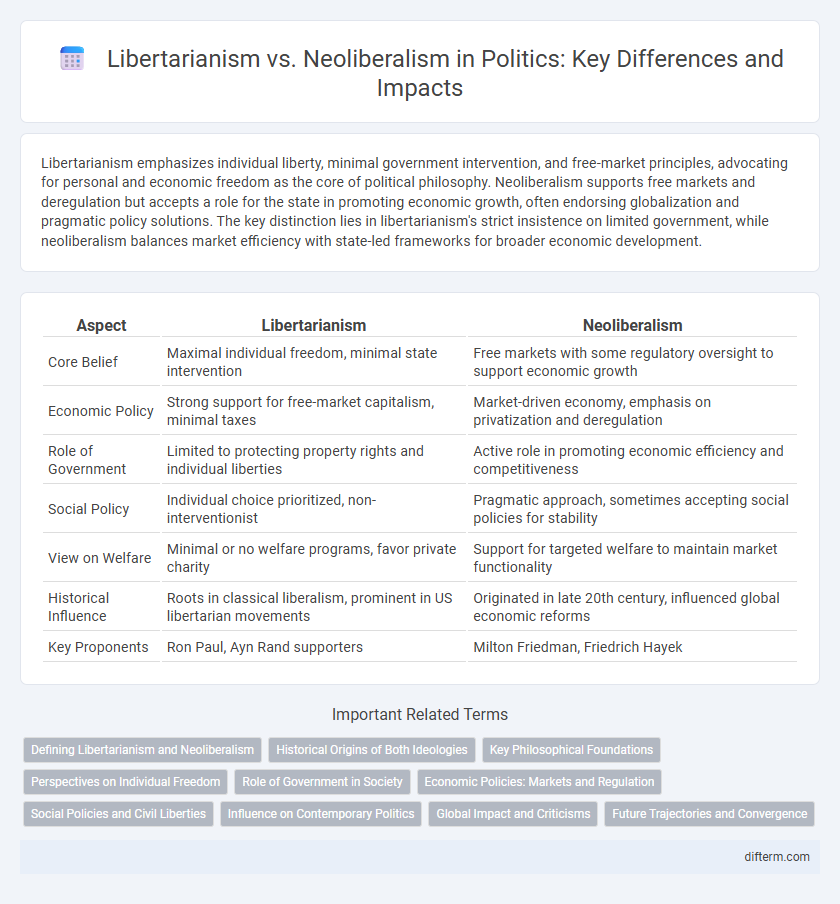Libertarianism emphasizes individual liberty, minimal government intervention, and free-market principles, advocating for personal and economic freedom as the core of political philosophy. Neoliberalism supports free markets and deregulation but accepts a role for the state in promoting economic growth, often endorsing globalization and pragmatic policy solutions. The key distinction lies in libertarianism's strict insistence on limited government, while neoliberalism balances market efficiency with state-led frameworks for broader economic development.
Table of Comparison
| Aspect | Libertarianism | Neoliberalism |
|---|---|---|
| Core Belief | Maximal individual freedom, minimal state intervention | Free markets with some regulatory oversight to support economic growth |
| Economic Policy | Strong support for free-market capitalism, minimal taxes | Market-driven economy, emphasis on privatization and deregulation |
| Role of Government | Limited to protecting property rights and individual liberties | Active role in promoting economic efficiency and competitiveness |
| Social Policy | Individual choice prioritized, non-interventionist | Pragmatic approach, sometimes accepting social policies for stability |
| View on Welfare | Minimal or no welfare programs, favor private charity | Support for targeted welfare to maintain market functionality |
| Historical Influence | Roots in classical liberalism, prominent in US libertarian movements | Originated in late 20th century, influenced global economic reforms |
| Key Proponents | Ron Paul, Ayn Rand supporters | Milton Friedman, Friedrich Hayek |
Defining Libertarianism and Neoliberalism
Libertarianism emphasizes individual liberty, limited government, and free-market capitalism, advocating minimal state intervention in both personal and economic matters. Neoliberalism supports free-market principles combined with a pragmatic approach to state regulation, aiming to foster economic growth through globalization, privatization, and deregulation. While libertarianism prioritizes absolute personal freedom, neoliberalism balances market efficiency with institutional frameworks to address market failures.
Historical Origins of Both Ideologies
Libertarianism originated from 18th-century classical liberal thought, emphasizing individual liberty, minimal state intervention, and free-market principles championed by philosophers like John Locke and economists such as Ludwig von Mises. Neoliberalism emerged in the mid-20th century as a pragmatic adaptation of classical liberalism, promoting free markets combined with limited state regulation and welfare policies, influenced by thinkers like Friedrich Hayek and Milton Friedman. Both ideologies share roots in economic liberalism but diverge in their emphasis on state roles and social policies.
Key Philosophical Foundations
Libertarianism centers on individual liberty, emphasizing minimal state intervention and the protection of private property as fundamental to personal freedom. Neoliberalism advocates for free-market capitalism combined with pragmatic government policies to promote economic growth and efficiency. Both ideologies prioritize economic freedom but differ in their views on the role of government and social welfare.
Perspectives on Individual Freedom
Libertarianism prioritizes absolute individual freedom by advocating minimal state intervention in personal and economic affairs, emphasizing personal autonomy and voluntary exchanges. Neoliberalism supports free-market principles but accepts some government regulation to ensure market efficiency and social order, balancing individual liberty with pragmatic governance. These contrasting perspectives highlight libertarianism's strict defense of personal sovereignty versus neoliberalism's pragmatic approach to freedom within institutional frameworks.
Role of Government in Society
Libertarianism advocates for minimal government intervention, emphasizing individual freedom and free-market principles as essential to societal progress. Neoliberalism supports a more active government role in regulating markets and providing social safety nets to ensure economic efficiency and equity. Both ideologies prioritize economic freedom but differ fundamentally on the extent and nature of government involvement in society.
Economic Policies: Markets and Regulation
Libertarian economic policies emphasize minimal government intervention, advocating for free markets and deregulation to promote individual economic freedom and innovation. Neoliberalism supports market-based solutions but accepts strategic government regulation to correct market failures and ensure economic stability. Both ideologies prioritize market efficiency, yet libertarianism seeks a more absolute market autonomy while neoliberalism balances free markets with pragmatic regulatory frameworks.
Social Policies and Civil Liberties
Libertarianism emphasizes minimal government intervention, advocating for maximum individual freedom in social policies and civil liberties, including strong protections for free speech, privacy, and personal choice. Neoliberalism supports market-oriented reforms but often accepts some government regulation in social policies to promote economic efficiency, sometimes resulting in nuanced stances on civil liberties depending on political context. Libertarian social policies prioritize personal autonomy, whereas neoliberalism balances individual freedoms with pragmatic governance to sustain market dynamics.
Influence on Contemporary Politics
Libertarianism emphasizes individual liberty and minimal government intervention, shaping contemporary politics by advocating for reduced state control and greater personal freedoms. Neoliberalism promotes free-market capitalism with strategic state involvement to foster economic growth and globalization, influencing policies on trade, deregulation, and privatization worldwide. Both ideologies impact political discourse by driving debates over the balance between market freedom and government regulation in shaping social and economic policies.
Global Impact and Criticisms
Libertarianism emphasizes minimal government intervention and individual freedom, promoting free markets and personal responsibility worldwide, which can lead to uneven social outcomes due to lack of regulation. Neoliberalism advocates for global trade liberalization, privatization, and deregulation to stimulate economic growth, though it faces criticism for exacerbating income inequality and undermining public welfare systems. Both ideologies influence international policy debates, with libertarianism often critiqued for neglecting social safety nets and neoliberalism challenged for prioritizing corporate interests over equitable development.
Future Trajectories and Convergence
Libertarianism and neoliberalism both advocate for market-based solutions but diverge on the role of government, with libertarianism emphasizing minimal state intervention and neoliberalism supporting regulatory frameworks to enable free markets. Future trajectories indicate potential convergence as libertarian calls for deregulation influence neoliberal policy adaptations, especially in tech and digital economies where innovation requires balanced oversight. Policy debates increasingly focus on privacy, corporate power, and individual freedoms, reflecting an evolving blend of libertarian emphasis on autonomy and neoliberal prioritization of market efficiency.
libertarianism vs neoliberalism Infographic

 difterm.com
difterm.com